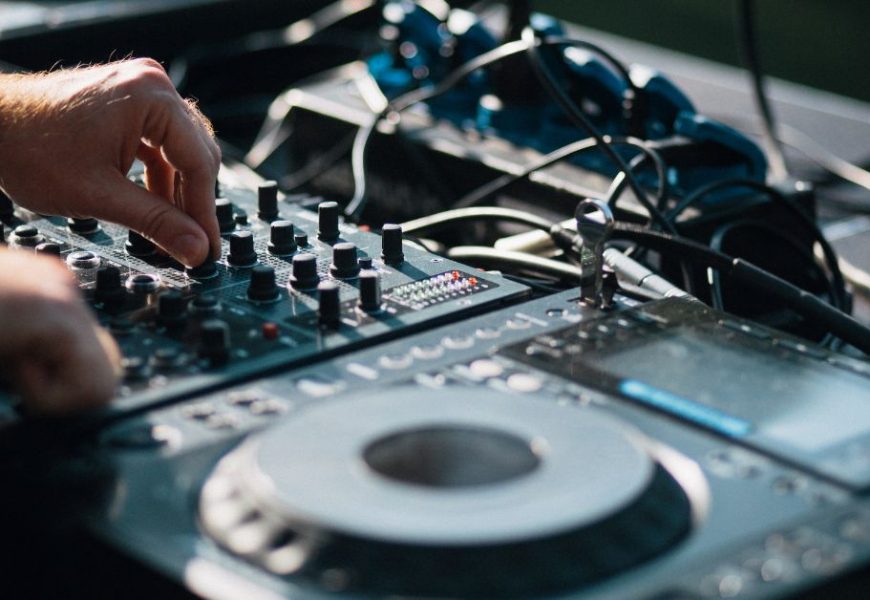How to become a DJ? With the growing popularity of nightclubs, music festivals, and events in India, dJing has become an exciting career path. DJs are now not only music mixers but have become artists who set the mood and the atmosphere. This career path is booming, providing creativity, fame, and good wage potential.
In this article, we will teach you how to become a DJ in India, dive into DJ salary insights, and learn about the best DJ learning courses available. If you have a passion for music and are wanting to start a career as a DJ this article will assist you to get started on the right track.
Table of Contents:
- Understanding the Role of a DJ
- Choosing Your DJ Style
- Essential Equipment for DJing
- Learning the Basics of DJing
- Creating Your Unique Sound
- Gaining Experience and Exposure
- Promoting Your DJ Career
- Conclusion
Understanding the Role of a DJ
Definition and Responsibilities: The role of a DJ or a Disc Jockey is to choose, mix, and play music that will entertain an audience. Their responsibility is far from just playing music; they set the mood, create an experience, and make sure that the crowd is engaged at all times. DJs usually work at several events like clubs, private parties, concerts, and festivals, and their skill to understand the crowd and maintain the energy is important for their career success.
Types of DJs:
- Club DJs: Club DJs usually play music at nightclubs or musical settings, where they are required to create the best world atmosphere by efficiently mixing tracks, changing tempos, and generating excitement in the audience with a fuse of popular and underground music.
- Mobile DJs: Mobile DJs are usually hired for private events like corporate functions, weddings, and parties. They get their own gear and are skilled in attending to different audiences with a variety of music styles.
- Radio DJs: Radio DJs host programs on radio stations where they interview guests, play music, or talk with their listeners. Their responsibilities include developing playlists that reflect the radio station’s theme and communicating with listeners via live engagement or pre-recorded broadcasts.
Skills Required: DJing requires a unique set of skills, including:
- Beatmatching: The skill to merge the tempos of two different tracks for efficient transitions.
- Sound Mixing: Fusing tracks with the use of software or hardware to get a smooth flow of music.
- Music Selection: A deep understanding of different music genres and knowing when to play specific tracks to match the vibe of the crowd.
- Creativity: DJs need to be creative with their mixes, experimenting with different sounds, effects, and transitions.
- Crowd Reading: A good DJ can understand the energy of the audience and change the playlist to keep the people entertained and engaged.
Choosing Your DJ Style
- Exploring Different Genres: As a DJ, firstly to carve your identity you need to explore various music genres. Exploring different styles is important as it helps you discover what relates to you the most. These styles can be electronic dance music, which consists of sub-genres like techno, house, and trance, as well as hip-hop, pop, rock, and even classical. Every genre has its own uniqueness and fan base. And playing with different types can enhance your mixing skills and overall sound.
- Importance of Finding Your Niche: Knowing your space is important in setting up a successful DJ career. A niche or a specialty allows you to target audiences and become a sought-after DJ for specific events or parties. Irrespective of your gravitating towards the rhythmic flow of hip-hop or high-energy beats of EDM, knowing your style or niche helps differentiate you in a competitive industry. It allows you to develop a unique brand identity and relate better with your audience, getting you more gigs and loyal followers.
- Researching Popular DJs in Your Chosen Style: To enhance your style, study popular DJs in your genre. Learn about their mixing techniques, selection of track, and style of performance to get insights into what works. Attending their sets, following them on social media, and listening to their mixes may all give you inspiration and ideas for your own performances. Also, evaluating their career paths can provide important insights on how to promote yourself and grow within the sector.
Essential Equipment for DJing
- Turntables: These are some crucial elements of any DJ setup. You can play or mix tracks from vinyl records or digital sound. They also enable you to alter and scrape music for unique sounds.
- Mixers: The turntables are connected to the mixer which helps to blend several tracks. It’s important to smoothly switch songs and modify the levels, effects, and tempo of each song.
- Headphones: To mix the next track before it is live, DJs depend on high-quality headphones to listen and preview. This makes sure that there are seamless transitions and assists in keeping the energy consistent during performances.
Learning the Basics of DJing
Online Courses: There are several online platforms that provide DJ courses, through which you can gain important skills like beatmatching, mixing, and using DJ software. Some of these well-known platforms are AAFT Online, Coursera, and Skillshare.
Tutorials: There are many free DJ tutorials that cover essential topics from beginner techniques to advanced methods. It’s a fantastic way to get your practice started at your own pace.
Books: For everyone who prefers reading, books like How to DJ Right and Last Night a DJ Saved My Life offer valuable insights into DJing, its history, and methods.
Creating Your Unique Sound
- Mixing and Blending Tracks: One of the very important skills of a DJ is seamless transition between tracks. Therefore, to perform smooth mixes that keep the energy high, DJs need to practice techniques like beatmatching and EQ adjustments.
- Developing a Signature Style: To show your uniqueness it’s essential to create your own distinct sound. Explore different genres, effects, and tempos to build a unique style that showcases your style and sets you apart from others.
Gaining Experience and Exposure
- Playing at Local Events, Parties, and Clubs: Begin with performing at gigs like house parties, clubs, or small events. These will help you gain confidence, enhance your skills, and grow local popularity.
- Collaborating with Other Musicians and DJs: It’s important to network with other DJs and musicians. Collaborations can bring new opportunities, offer learning, and help you reach a wider range of audience in the music scene.
Promoting Your DJ Career
- Marketing Yourself: Create an impactful personal brand by designing a logo, creating a website, and developing a portfolio of your best work.
- Utilizing Social Media and Music Platforms: Make use of platforms like Mixcloud, SoundCloud, and Instagram to share your tracks, hook your fans, and collaborate with other DJs. To stay relevant and to build an audience, post content frequently.
Conclusion
To become a successful DJ in India, start by mastering key DJ skills such as beatmatching, mixing, and crowd reading. Choose your style, invest in essential equipment like turntables and mixers, and gain experience by playing at local events and collaborating with other musicians. Promoting yourself on platforms like SoundCloud and Mixcloud will help grow your audience and land gigs. With DJing on the rise, research “disc jockey job vacancies” and “DJ salary in India” to gauge your career path.
Ready to kickstart your DJ career? Enroll in AAFT Online’s DJing course to gain the skills and knowledge you need to succeed!
(Visited 2,070 times, 5 visits today)
Popular Search
Top 10 DJ India
Makeup Steps
Advantages of Makeup
Interior Designer Salary
Makeup Artist Course
Benefits Of Photography
Hospital Waste Management
Types of Fashion Designing
Types of Lenses in Photography
How to Become a Radio Jockey
Best Nutrition Courses in India
Importance of Media Management
How To Become a Dietitian in India
Importance of Nutrition in Health
Interior Design History and Origins
Top 10 Famous Interior Designers
Top 10 Music Labels in India
Top 10 Best Animation Studios in India
Top 10 Nutraceutical Companies in India
Top 10 Fashion Designers in the World
How To Write a TV Commercial Script
Top 10 Career Opportunities in Fashion Designing
Advantages and Disadvantages of Animation



















